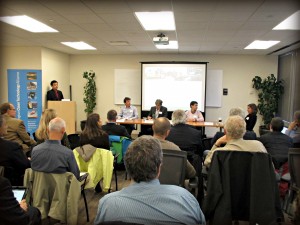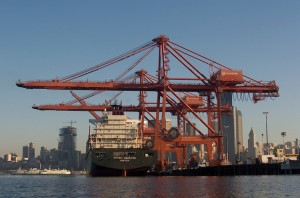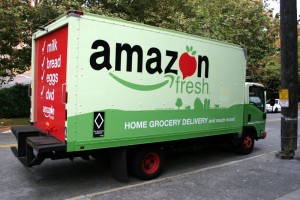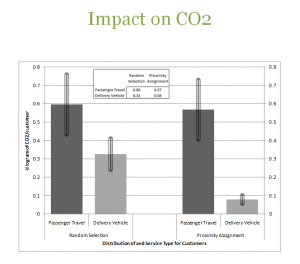 Don’t worry, if you couldn’t make it to yesterday’s Breakfast Series event, here is everything you missed!
Don’t worry, if you couldn’t make it to yesterday’s Breakfast Series event, here is everything you missed!
Leaders in the Pacific Northwest are coming up with innovative solutions for maximizing efficiency in production and distribution for the retail industry. As more people become aware of the carbon footprint of their purchasing power they are looking for more ways to quantify that impact and reduce it.
K2 Sports, a world renowned winter sports company headquartered in Seattle, is taking the next step towards understanding the environmental impacts of its supply chain and product design choices. By developing the Higg Index for equipment with the Outdoor Industry Association’s Sustainability Working Group, the company continues to explore the complexity of the issue. Matt O’Laughlin, Sr. Design Engineer at K2 Sports, explains, “Designers have always understood the financial and performance impacts of their design decisions, but this tool will allow them to further evaluate those decisions with an environmental lens.”
Being in the winter sports industry, K2 Sports is concerned about the effects of climate change on the consistency of winter and with good reason. Studies predict a 75% decline in Pacific Northwest snowpack by 2050** in response to warmer winters under higher emissions scenarios*. Less snowfall has already resulted in 1.6 million fewer skier visits and over $6M in industry losses in Washington state over the past decade*. K2 is getting involved with Protect Our Winters to advocate for President Obama’s Climate Action Plan and the U.S. Environmental Protection Agencies proposed Carbon Pollution Standard to fight climate change.
*Source: Climate Impacts On The Winter Tourism Economy in the US, 2012”
** Corrected from an earlier version that stated 2015
 Businesses in retail production are not the only ones feeling the pressure from consumers to be green conscious. Shipping companies are under pressure from customer representatives, investor CDP’s and employees to be responsible for their carbon footprint. Derek Eisel, Director of Sales at Scope 5, explains how Expeditors International put together over two hundred “green teams” around the world to better understand the impact of their business on the environment, how to improve it and detail the costs of being more sustainable. Businesses are consolidating and moderating their shipping impact for cost saving reasons and for green reasons. Scope 5 sustainability management data software is calculating metrics for companies to maximize efficiency by redesigning the supply chain, upgrading transportation vehicles and adding more cargo in shipping containers. Innovation in the shipping and distribution of retail goods does not end with Expeditors and Scope 5 however, there is another major Seattle retailer that is changing consumer behavior and reducing its impact on the environment.
Businesses in retail production are not the only ones feeling the pressure from consumers to be green conscious. Shipping companies are under pressure from customer representatives, investor CDP’s and employees to be responsible for their carbon footprint. Derek Eisel, Director of Sales at Scope 5, explains how Expeditors International put together over two hundred “green teams” around the world to better understand the impact of their business on the environment, how to improve it and detail the costs of being more sustainable. Businesses are consolidating and moderating their shipping impact for cost saving reasons and for green reasons. Scope 5 sustainability management data software is calculating metrics for companies to maximize efficiency by redesigning the supply chain, upgrading transportation vehicles and adding more cargo in shipping containers. Innovation in the shipping and distribution of retail goods does not end with Expeditors and Scope 5 however, there is another major Seattle retailer that is changing consumer behavior and reducing its impact on the environment.

Everyone knows that Amazon.com is the world’s largest online retailer but not everyone realizes its efforts to maximize efficiency and save energy with Amazon’s Waste Reduction Programs. “Reducing waste benefits customers and companies,” says Felipe Sandoval, Transportation Manager at Amazon, “opportunities are present all along the supply chain.” Amazon’s “Frustration Free Packaging” uses less materials and less space so that trucks are moving less air and more goods. Amazon Lockers offer a delivery option to customers who can’t reliably get their online purchases at work or at home. It also delivers orders at the first attempt which means there are fewer trucks in your neighborhood and fewer repeated trips to make one delivery. Online shoppers also have the option to “Subscribe and Save” which increases the opportunities to ship more packages in one truck and increase truck utilization.

All of this talk about truck utilization, shipping optimization and maximizing efficiency make it seem that more and more people will be taking advantage of the convenience and efficiency of these services, regardless of their environmental conscious. So how eco-conscious is it to have your groceries delivered instead of driving to the store? VERY!
Dr. Anne Goodchild, Associate Professor of Civil and Environmental Engineering at the University of Washington says, “In terms of miles traveled, there are overwhelmingly fewer miles traveled by a delivery truck than by passenger vehicles going to the stores.” Grocery delivery is like the bus for food. The CO2 emissions per mile traveled is more for delivery trucks but still overall less than the CO2 impact of all individuals driving to the store. By doing shopping online with a reasonably efficient service you can cut your CO2 impact by half.
As we go into the holiday season, rest easy knowing that sustainability costs of the retail experience are not as wasteful and inefficient as they seem, especially if you order online.